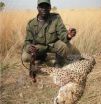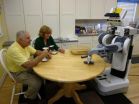(Press-News.org) JOHANNESBURG, SOUTH AFRICA (October 25, 2012) – A recent report says illegal hunting of wildlife in South African Development Community (SADC) states can lead to the eradication of many species across extensive areas and even complete ecological collapse.
Africa's iconic large carnivores, such as cheetah, lion, leopard, and wild dog, are particularly vulnerable to this practice, either because they are caught in the bycatch from unselective methods such as snaring, or due to loss of prey. The report says that the scale and severity of the threat is such that, without urgent intervention, one of SADC's most valuable resources will be lost across vast areas of the region.
The report: "Illegal hunting and the bush-meat trade in savanna africa: drivers, impacts, and solutions to address the problem" is authored by Panthera, Zoological Society of London, and Wildlife Conservation Society.
SADC wildlife agencies are beginning to tackle this looming conservation crisis. At a two-day meeting in Johannesburg last week, heads of wildlife agencies and other representatives of government, supported by IUCN (East and Southern Africa Region),UNDP, FAO, community organizations, and conservation NGOs unanimously agreed on the urgency of tackling the practice of illegal bushmeat extraction. SADC member states represented at the workshop included Mozambique (current chair country); Botswana, Malawi, Namibia, South Africa, Tanzania, Zambia and Zimbabwe.
The groups at the workshop noted that current rates of bushmeat extraction are unsustainable and can lead to local extinctions and the collapse of ecosystems. They also noted that many poor and marginalized communities depend on the contribution wildlife makes to their food security, and called for support from the development community in helping to curb illegal hunting and bushmeat trade.
Sustainable management of wildlife can make significant contributions to the food security of rural communities and to local and national economies such as through tourism and community-based natural resource management initiatives. In Namibia, for example, well-regulated hunting results in a total of 26 million metric tons of legal, sustainably harvested game meat traded every year.
Where illegal hunting is rampant, trophy-hunting tourism concessions earn as little as 4 percent of what they could if hunting was regulated.
Dr. Rene Czudek from the FAO Subregional Office (SADC), who hosted the workshop said: "There is an urgent need to search for viable solutions that will ensure the sustainable use of SADC's world renowned wildlife resources while contributing to the development of poor rural communities."
Mr. Nyambe Nyambe from the SADC Food, Agricultural and Natural Resources Directorate applauded the parties for drawing the attention of SADC to such an important issue, and noted that SADC aims to protect wildlife and their habitats and promote sustainable use of natural resources. He called on all stakeholders to work together to move this process forward .
It was acknowledged at the workshop that illegal bushmeat extraction and the methods used to hunt wildlife impact heavily on key species that need our protection.
Dr. Sarah Durant of ZSL/WCS, said: "The continued survival of cheetah across large tracts of their range in the SADC region depends on finding ways to ensure that bushmeat extraction is sustainable."
Adding to this, Dr. Netty Purchase of ZSL/WCS, said: "Most cheetahs and African wild dogs occur outside protected areas, coexisting with people and their livestock, and are very vulnerable to snaring and the loss of their wild prey."
Dr. Peter Lindsey from Panthera said: "The unique diversity and density of wildlife in SADC countries has potential to create significant economic and social benefits for the people of the region. However, these assets are severely threatened by illegal hunting and the bushmeat trade."
The participants developed a set of guiding principles needed to address bushmeat extraction in the SADC region. They called on SADC to commit to these principles to avert the impending conservation crisis. Failure will not only have dire consequences for biodiversity conservation but will also lead to the collapse of an ecosystem service upon which many of the region's most vulnerable communities depend.
INFORMATION:
The workshop was organized by the Range Wide Program for Cheetah and Wild Dog, on behalf of the FAO-SFS (SADC Subregional office), as a result of request from four directors of wildlife agencies within SADC (Malawi, Mozambique, Zambia and Zimbabwe).
Partners in the project
Achieving food security for all is at the heart of the United Nations agency, the Food and Agriculture Organisation's (FAO) efforts - to make sure people have regular access to enough high-quality food to lead active, healthy lives. FAO's mandate is to raise levels of nutrition, improve agricultural productivity, better the lives of rural populations and contribute to the growth of the world economy. www.fao.org
Founded in 1826, the Zoological Society of London (ZSL) is an international scientific, conservation and educational charity whose mission is to promote and achieve the worldwide conservation of animals and their habitats. Our mission is realised through our groundbreaking science, our active conservation projects in more than 50 countries and our two Zoos, ZSL London Zoo and ZSL Whipsnade Zoo. For more information visit www.zsl.org
The Wildlife Conservation Society saves wildlife and wild places worldwide. We do so through science, global conservation, education and the management of the world's largest system of urban wildlife parks, led by the Flagship Bronx Zoo. Together these activities change attitudes toward nature and help people imagine wildlife and humans living in harmony. WCS is committed to this mission because it is essential to the integrity of life on Earth. Visit: www.wcs.org
The Southern African Development Community (SADC) vision is that of a common future, a future within a regional community that will ensure economic well-being, improvement of the standards of living and quality of life, freedom and social justice and peace and security for the people of Southern Africa. This shared vision is anchored on the common values and principles and the historical and cultural affinities that exist between the people of Southern Africa. SADC's mission is to promote sustainable and equitable economic growth and socio-economic development through efficient productive systems, deeper co-operation and integration, good governance, and durable peace and security, so that the region emerges as a competitive and effective player in international relations and the world economy. www.sadc.int
Panthera, founded in 2006, is the world's leading organization devoted exclusively to the conservation of wild cats and their ecosystems. Utilizing the expertise of the world's premier cat biologists, Panthera develops and implements global conservation strategies for the largest, most imperiled cats – tigers, lions, jaguars, and snow leopards. Representing the most comprehensive effort of its kind, Panthera works in partnership with local and international NGOs, scientific institutions, local communities and governments around the globe. www.panthera.org
The Range wide conservation program for cheetahs and African wild dogs (RWP) was initiated in 2007 in recognition of the fact that cheetahs and African wild dogs require large areas of land to sustain viable populations, and that both species were declining or extinct in much of their former range. To maintain such large areas there was a need to engage with stakeholders beyond traditional wildlife areas and to work with governments to find ways to protect these two species outside of gazetted wildlife estates. There are three regions under the RWP – North, West and Central Africa, East Africa and Southern Africa each managed by a regional coordinator. www.cheetahandwilddog.org
CONTACT:
WCS: STEPHEN SAUTNER: (1-718-220-3682; ssautner@wcs.org)
PANTHERA: PETER LINDSEY: plindsey@panthera.org)
FAO: DR. RENE CZUDEK: Rene.Czudek@fao.org)
Report: Bushmeat pushes Southern African species to the brink
2012-10-26
ELSE PRESS RELEASES FROM THIS DATE:
UC Davis researchers develop new drug delivery system for bladder cancer using nanoparticles
2012-10-26
(SACRAMENTO, Calif.) -- A team of UC Davis scientists has shown in experimental mouse models that a new drug delivery system allows for administration of three times the maximum tolerated dose of a standard drug therapy for advanced bladder cancer, leading to more effective cancer control without increasing toxicity.
The delivery system consists of specially designed nanoparticles that home in on tumor cells while carrying the anti-cancer drug paclitaxel. The same delivery system also was successfully used to carry a dye that lights up on imaging studies, making it potentially ...
New genomics study shows ancestry could help solve disease riddles
2012-10-26
LA JOLLA, CA – October 25, 2012 – Explosive advancement in human genome sequencing opens new possibilities for identifying the genetic roots of certain diseases and finding cures. However, so many variations among individual genomes exist that identifying mutations responsible for a specific disease has in many cases proven an insurmountable challenge. But now a new study by scientists at The Scripps Research Institute (TSRI), Scripps Health, and Scripps Translational Science Institute (STSI) reveals that by comparing the genomes of diseased patients with the genomes of ...
A 'nanoscale landscape' controls flow of surface electrons on a topological insulator
2012-10-26
CHESTNUT HILL, MA (October 25, 2012) – In the relatively new scientific frontier of topological insulators, theoretical and experimental physicists have been studying the surfaces of these unique materials for insights into the behavior of electrons that display some very un-electron-like properties.
In topological insulators, electrons can behave more like photons, or particles of light. The hitch is that unlike photons, electrons have a mass that normally plays a defining role in their behavior. In the world of quantum physics, where everyday materials take on surprising ...
Changing the balance of bacteria in drinking water to benefit consumers
2012-10-26
WASHINGTON, Oct. 25, 2012 — The latest episode in the American Chemical Society's (ACS') award-winning Global Challenges/Chemistry Solutions podcast series reports that scientists have discovered a plausible way to manipulate the populations of mostly beneficial microbes in "purified" drinking water to potentially benefit consumers.
Based on a report by Lutgarde Raskin, Ph.D., in ACS' journal Environmental Science & Technology, the new podcast is available without charge at iTunes and from www.acs.org/globalchallenges.
In the new episode, Raskin explains that municipal ...
Small marine organisms' big changes could affect world climate
2012-10-26
In the future, warmer waters could significantly change ocean distribution of populations of phytoplankton, tiny organisms that could have a major effect on climate change.
Reporting in this week's online journal Science Express, researchers show that by the end of the 21st century, warmer oceans will cause populations of these marine microorganisms to thrive near the poles and shrink in equatorial waters.
"In the tropical oceans, we are predicting a 40 percent drop in potential diversity, the number of strains of phytoplankton," says Mridul Thomas, a biologist at Michigan ...
Small organisms could dramatically impact world's climate
2012-10-26
EAST LANSING, Mich. — Warmer oceans in the future could significantly alter populations of phytoplankton, tiny organisms that could have a major impact on climate change.
In the current issue of Science Express, Michigan State University researchers show that by the end of the 21st century, warmer oceans will cause populations of these marine microorganisms to thrive near the poles and may shrink in equatorial waters. Since phytoplankton play a key role in the food chain and the world's cycles of carbon, nitrogen, phosphorous and other elements, a drastic drop could have ...
Individual gene differences can be tested in zebrafish
2012-10-26
HERSHEY, Pa. -- The zebrafish is a potential tool for testing one class of unique individual genetic differences found in humans, and may yield information helpful for the emerging field of personalized medicine, according to a team led by Penn State College of Medicine scientists. The differences, or mutations, in question create minor changes in amino acids -- the building blocks of DNA -- from person to person. Zebrafish can be used as a model to understand what biological effects result from these genetic mutations.
Personalized medicine uses modern technology and ...
Monster galaxy may have been stirred up by black-hole mischief
2012-10-26
Astronomers using the NASA/ESA Hubble Space Telescope have obtained a remarkable new view of a whopper of an elliptical galaxy, with a core bigger than any seen before. There are two intriguing explanations for the puffed up core, both related to the action of one or more black holes, and the researchers have not yet been able to determine which is correct.
Spanning a little over one million light-years, the galaxy is about ten times the diameter of the Milky Way galaxy. The bloated galaxy is a member of an unusual class of galaxies with an unusually diffuse core filled ...
Exercise boosts satisfaction with life, researchers find
2012-10-26
UNIVERSITY PARK, Pa. -- Had a bad day? Extending your normal exercise routine by a few minutes may be the solution, according to Penn State researchers, who found that people's satisfaction with life was higher on days when they exercised more than usual.
"We found that people's satisfaction with life was directly impacted by their daily physical activity," said Jaclyn Maher, graduate student in kinesiology. "The findings reinforce the idea that physical activity is a health behavior with important consequences for daily well-being and should be considered when developing ...
Robots in the home: Will older adults roll out the welcome mat?
2012-10-26
Robots have the potential to help older adults with daily activities that can become more challenging with age. But are people willing to use and accept the new technology? A study by the Georgia Institute of Technology indicates the answer is yes, unless the tasks involve personal care or social activities.
After showing adults (ages 65 to 93 years) a video of a robot's capabilities, researchers interviewed them about their willingness for assistance with 48 common household tasks. Participants generally preferred robotic help over human help for chores such as cleaning ...




